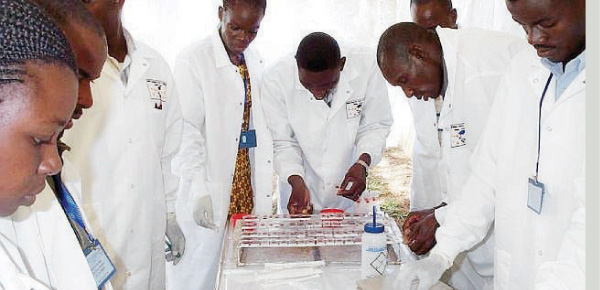 Researchers in a laboratory. Could the latest research on HIV/Aids lead to treatment of the scourge? [PHOTO: COURTESY/STANDARD]
Researchers in a laboratory. Could the latest research on HIV/Aids lead to treatment of the scourge? [PHOTO: COURTESY/STANDARD]
By GATONYE GATHURA
Nairobi, Kenya: The women of Nairobi, who stunned the world with their ability to resist the Aids virus about two decades ago, have once again yielded exclusive information that could lead to the development of new treatments and vaccines for the elderly.
Last year, the World Health Organisation (WHO) said life expectancy in Kenya had jumped from 44 years four decades ago to 63 years today.
But for most, the health body indicated, about eight of these additional years are spent in pain partially because there has been little research in treatments for the elderly.
On Tuesday, top researchers from Kenya and Canada, who have been hunting for a HIV vaccine for nearly three decades, said they have discovered how ageing and menopause are linked to the disease fighting capacity in the female genital track.
Seven world-acclaimed researchers including, Prof Walter Jaoko and Dr Joshua Kimani of the University of Nairobi and others Manitoba of Canada in their findings published in the peer-reviewed journal Immunity & Ageing believe they are the first to have studied the link between aging, menopause and immunity in cervical tissue. “To the best of our knowledge this is the first extensive study that analysed the impact of age and menopause on production of immune hormones in the cervical compartment of African women,” they wrote.
Specifically, they were studying what are called cytokines and chemokines - chemicals in the body that direct disease fighting cells how to react when one has been infected by disease-causing organisms.
With age and menopause the ability of these hormones to react appropriately has been found to wane and in this particular study it was found to be even more in the cervical tissue.
The team took blood and cervical tissue samples from 176 commercial sex workers in Pumwani, Nairobi, which were shipped to Winnipeg, Manitoba, Canada for analysis.
Research group
The women belonging to a research group called the Pumwani Sex Worker Cohort in Nairobi, established in 1985, by the two universities are most likely among the most studied humans on earth.
Some women in this group have intrigued researchers with their ability to resist the Aids-causing virus even after heavy and sustained exposure through risky sex work and scholars have remained hopeful that they will yield a vaccine against the scourge.
In this particular study the researchers involved HIV negative women from relatively young age of 30 to grandmothers of 65 and found that older women and those who had reached menopause had diminished infection-fighting capacity specifically in the genital track.
Though the researchers did not dwell on the implication of weakened immunity in the genital track and commercial sex, the study suggests that these women should consider retiring early before they become prone to various urinary tract infections.
While the team did not look at the duration the women had been involved in sex work, it was not lost to them that the profession had an impact on lose of body immunity. Sex work, they wrote, is known to have an impact on how hormones in the cervical tissue work. Although these women, including a group in Majengo slums in Nairobi, may not appear on the country’s list of “Mashujaa” they have all the same made a monumental contribution to the world knowledge of HIV.
Women used
The women have been the topic of more than 300 research papers over the past 28 years, which have been published across the world enhancing the careers of many local and foreign researchers. Tens of medical researchers have these women to thank for their PhD degrees.
Several highpoints of the study include the discovery that mothers can pass the HIV to their infants through breast-feeding and secondly that people with a venereal disease were at a greater risk of HIV infection.
But it was the discovery that a sub-group of these women were HIV-resistant that truly rocked the world of infectious disease. If the new discovery could speedily lead to new treatments for the elderly then Kenyans may, even if grudgingly, thank these women.
Treatments for the elderly, now the biggest research agenda in developed countries, is a cause for concern in Kenya with only nine per cent of health workers having any training in geriatric care. According to a policy brief by the National Council for Population and Development, the population of persons aged 60 years and above increased from one million in 1989 to 1.9 million in 2009 and is projected to reach about there million by 2030.
As expected, the document shows more chronic illness among the older populations compared to the younger but more important is that more than a third of the old do not go to hospitals when they get sick.
 The Standard Group Plc is a multi-media organization with investments in media platforms spanning newspaper print
operations, television, radio broadcasting, digital and online services. The Standard Group is recognized as a
leading multi-media house in Kenya with a key influence in matters of national and international interest.
The Standard Group Plc is a multi-media organization with investments in media platforms spanning newspaper print
operations, television, radio broadcasting, digital and online services. The Standard Group is recognized as a
leading multi-media house in Kenya with a key influence in matters of national and international interest.











